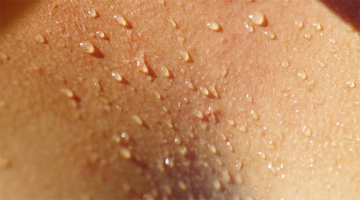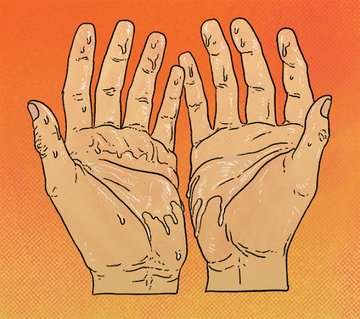You scoff at the statement “men are from Mars and women are from Venus”, but does it ring true when it comes to how we sweat? Science has discovered some key differences between sweating among men and women (ie. men tend to sweat more) - but how far does it go? This post will take a look at scientifically observed differences between men and women, both old and new.
Volume Differences - How Much One Sweats
Before puberty hits, we sweat equally in measure. Prepubescent girls and boys produce the same volume of sweat. But then comes the hormones. Once girls and boys hit puberty, the volume of sweat produced by each sex varies. Testosterone, the key male hormone, enhances men’s sweat production meaning they tend to sweat heavier than women.
On the other hand, estrogen, the key female hormone, promotes lower body temperatures in women. This reduces women’s need to sweat and therefore, it reduces the volume of sweat they produce.
There's also the factor of body mass. Since men tend to have a greater body mass than women, they tend to generate more heat, resulting in more sweat production.
Onset Differences - Who Starts Sweating First
Girls typically enter puberty before boys do and naturally, one might assume that they would start sweating earlier than boys as well. The jury is still out on this one because parents and friends may not spot heavy sweating in girls very easily. Usually when they do, it’s an abnormality.
But when boys sweat, it’s very noticeable because it’s easier to see and smell - few human beings can drench a sports jersey and smell like B.O. like a teenage boy. That’s testosterone at work (among other factors). So in a sense, determining who sweats first is a matter of context. Girls may indeed begin sweating earlier than boys, but boys begin to sweat at a much more noticeable rate than girls do.
Efficiency Differences Who Sweats More “Efficiently”
So far, it seems that men are at a disadvantage when it comes to sweat. They sweat too much, they sweat too early - no wonder most antiperspirant and deodorant commercials seem to target men! But don’t feel bad fellas - for all the sweating men do, they do it more efficiently than women.
In a study conducted at Osaka International University and Kobe University, Japanese researchers examined the differences in men’s and women’s sweating response to changing exercise intensity.
The researchers had four groups of participants cycle continuously for one hour: trained and untrained females, and trained and untrained males. All four groups were placed in a controlled climate and subject to intervals that increased in terms of intensity.
The result? Men showed a more pronounced sweating response to the exercise as the intervals became more intense. The untrained females demonstrated the most inefficient sweat response - they had to get hotter before they would sweat.
For the ladies who think sweating is gross and would like to stay dry, remember this: an inefficient sweat response can be dangerous. If the body can’t sweat adequately during exercise or on hot days, there is an increased risk of dehydration and heat exhaustion. That means women may have to pay more attention to hydration and exertion than men do during exercise or in hot conditions.
Consistency & Odor Differences (biochemical properties)
We’ll set the record straight before we dive into this one: both men and women can have B.O. But let’s start with the obvious. Men have a higher likelihood of having issues with B.O., because they sweat more heavily and also have more apocrine glands - the ones associated with odor. But ladies aren’t off the hook, because they too possess distinct scents. The differences are most noticeable when you sniff the armpits.
Men’s armpits tend to smell more like cheese, whereas women’s armpits smell more like onions or grapefruits. Researchers in Switzerland were even able to identify the chemicals responsible for these odour differences among men and women.
Both sexes produce the chemicals 3-hydroxy-3-methylhexanoic acid and 3-methyl-3-sulfanylhexan-1-ol in their sweat. But that’s where the similarities end. Men’s sweat contains more 3-hydroxy-3-methylhexanoic acid, which produces a cheesy odor. Women’s sweat contains more 3-methyl-3-sulfanylhexan-1-ol, which produces a fruity (or oniony) flavour.
There’s still more…
The body itself doesn’t produce any of these chemicals - they’re the byproduct of enzymes produced from bacteria. Different bacteria likely produce different enzymes. It would then appear that men carry more of certain bacteria (probably the ones that produce the cheesy odour) while women carry more of other types (probably the ones that produce the onion odour).
Even then, it’s not clear why men and women carry more (or less) of certain bacteria when compared to each other. Hormones may play a role, but no one knows for sure.
How Does Hyperhidrosis Affect Men vs Women
Here’s a twist when it comes to differences and similarities in sweat among the sexes: hyperhidrosis, or excessive sweating, affects men and women equally. A fairly equal number of men and women suffer from excessive sweating, and it doesn’t seem to be worse in either genders. Both men and women who have severe hyperhidrosis report having a lower quality of life.
Where men and women differ when it comes to excessive sweating is in terms of how they manage it. Women are more likely to seek treatment for hyperhidrosis than men are. In fact, a study conducted back in 2007 found that women with clammy handshakes were twice as likely to seek medical attention than men were.
Researchers at the Saint Louis University of School of Medicine analyzed the records of 515 patients who sought treatment for hyperhidrosis. They found roughly 67% of those who pursued treatment were women.
However, during the 65th annual meeting of the American Academy Dermatology, Dr. Dee Anna Glaser found that men were significantly more likely to seek treatment for facial sweating than women were.
This finding hints at how excessive sweating affects the self-perception of men and women differently. Women seem more self-conscious when it comes to sweaty palms, whereas seem more insecure about a sweaty forehead.
Sweat Production - A Matter of Gender
There’s no denying that men and women sweat differently because of differences in hormones, genetics and more. Of course, society and culture may influence sweating as well since men and women are encouraged to participate in different activities which may lead to more or less sweating. Nevertheless, understanding the biological differences can help us understand how to prevent and treat sweating problems, especially in the case of excessive sweating.








